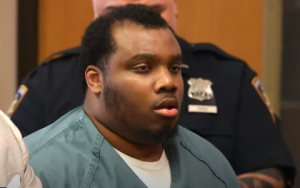A Suffolk County court has sentenced Janelle Funderburk, a 21-year-old man, to 25 years to life in prison for the attempted murder of Suffolk County Police Officer Michael Lafosse. The sentencing follows a harrowing incident in which Funderburk shot Officer Lafosse, leaving him partially paralyzed. The case, which has drawn significant attention due to its implications for law enforcement safety and the intersection of mental health and criminal justice, reached an emotional climax during the sentencing hearing.

The Incident
On the day of the incident, Officer Michael Lafosse, a six-year veteran of the Suffolk County Police Department, was responding to a call when he encountered Funderburk. The young man, who had a history of criminal behavior and mental health issues, fired a shot at Officer Lafosse, hitting him in a vital area. The injury was severe enough to partially paralyze Lafosse’s leg, necessitating ongoing physical therapy twice a week. Despite the severity of the injury, medical professionals believe there is a possibility for nerve regeneration over time.
Courtroom Sentencing and Reactions
During the sentencing hearing, Officer Lafosse entered the courtroom using a cane, accompanied by his pregnant wife. The courtroom was filled with fellow police officers, many of whom had supported Lafosse during his recovery. In a poignant statement, Lafosse addressed Funderburk directly, expressing that he was simply doing his job on the day of the shooting. He made it clear that he would never forgive Funderburk for the life-altering injury he inflicted.
The judge presiding over the case described Funderburk as a “menace to society” before handing down the sentence. He expressed his belief that Funderburk would serve even more time if the decision were entirely up to him. The 25-years-to-life sentence is a reflection of the severity of the crime and the risk Funderburk posed to the community.
Funderburk’s Background and Mental Health Issues
Janelle Funderburk’s life has been marked by a troubled history, including multiple run-ins with the law. Officials revealed that Funderburk had been charged seven times before reaching the age of 18. In the month leading up to the shooting, he had been arrested yet again, but was released rather than being held in custody.
Funderburk’s mother, in a statement read by a friend during the court proceedings, expressed deep sorrow over her son’s actions and his life trajectory. She highlighted his struggles with schizophrenia and an opioid addiction, suggesting that these issues were central to his criminal behavior. She conveyed her belief that the system had failed her son, who had grown up in an environment marked by incarceration—his father and brothers are also in jail.
The defense attorney echoed these sentiments, arguing that Funderburk’s mental health crises were inadequately addressed by the system. The lawyer pointed out that there were numerous red flags throughout Funderburk’s life that indicated he needed help, but these warnings were not heeded.
The Aftermath and Broader Implications
The case has underscored the challenges faced by law enforcement officers when dealing with individuals suffering from severe mental health issues. Officer Lafosse’s injury has not only affected his ability to perform his duties but has also impacted his personal life. He shared the emotional toll of not being able to engage in simple activities with his daughter due to his physical limitations.
Law enforcement officials have used this case to send a strong message: attempts to harm police officers in Suffolk County will be met with the harshest possible penalties. The case also highlights the ongoing debate about the adequacy of mental health care and addiction treatment in the criminal justice system. Funderburk’s case is seen by some as a tragic example of what can happen when these issues are not properly addressed.
As Officer Lafosse continues his recovery, the community remains divided over how best to handle cases involving individuals with severe mental health and addiction problems. While Funderburk’s sentence ensures that he will not pose a danger to society for the foreseeable future, it also raises questions about how the system can better support individuals like him before they reach such a breaking point.














